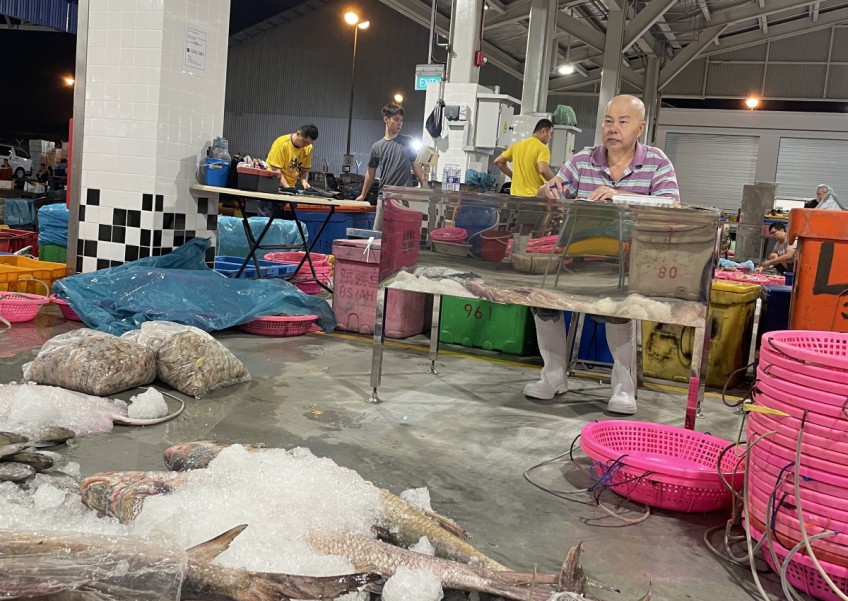'Tears and laughter': Fish merchants reflect on 27 years of memories after moving from Senoko to Jurong Fishery Port


 PUBLISHED ONMarch 19, 2024 8:22 AMByChing Shi Jie
PUBLISHED ONMarch 19, 2024 8:22 AMByChing Shi JieAfter 27 years of calling Senoko Fishery Port their home, some 21 fish merchants have begun moving to new market lots in Jurong on Monday (March 18) night.
For Tan Yew Meng, the move to Jurong Fishery Port, which is Singapore's only other fishing port, is a fresh start after two years of low footfall at the Senoko facility.
The 64-year-old, who manages San Wong Fishery, told AsiaOne on the first day of relocation in Mandarin: "I miss the lively crowds during Chinese New Year in the first few years at Senoko.
"But business has been getting from bad to worse over the past two years. There aren't a lot of people there anymore."
In June 2020, the Singapore Food Agency (SFA) announced that the Senoko port would be closed and the land it sits on, the size of four-and-a-half football fields, would be returned to the state.
Its future use is not known.
SFA said that the closure is due to "declining activity and customer patronage" there.
The volume of seafood handled at Senoko dropped from 15,190 tonnes in 2000 to 2,743 tonnes 22 years later.
Last year, only two per cent of Singapore's total seafood imports were handled by Senoko, they added.
While the port port will be shut on March 31, 17 of its tenants have begun moving to the new annex in Jurong - a single-storey extension building spanning 1,000 sqm - that has been built to accommodate them.
The remaining four merchants will join the main market in the Jurong facility, where there are more than 100 other merchants.
Under the bright fluorescent lights in a port that never sleeps, Tan, who relies on a loyal customer base of elderly fishmongers, is unbothered by the presence of four times more fish merchants.
"There's not much choice but to move here, so I'll do my best to survive from day to day," he said. "This is a bigger wholesale seafood market which will definitely attract new customers."
Like Tan, many of the fish merchants began their trade at the decades-old market in Kangkar, a village at the end of Upper Serangoon Road.
In 1984, they shifted to Punggol Fishing Port, where they operated until 1997. They then moved to Senoko to make way for the development of Punggol New Town.
The fond memories of "growing up" at Senoko port is something that 44-year-old Daniel Pe has brought with him to Jurong.
Pe, chairman of the Punggol Fish Merchants Association and a second-generation fish merchant, said: "It's a place of its own… we work 364 days there, so everybody knows everybody.
"And I grew up there, 20 over years helping dad while I was in National Service. All the tears and laughter."
Pe, who represents most of the tenants previously from Senoko, said that his members were shocked and reluctant to move following the government's announcement in 2020 to centralise wholesale seafood in Singapore at the Jurong port.
"But I would say that they have accepted the decision. It's about moving on, and not hopping over," he said. "We are positive that there will be more opportunities here."
Meanwhile, one fish merchant is choosing not to be too nostalgic with the impending closure of the Senoko port.
Annie Lee, 60, who runs Hai Soon Lian Hak, told AsiaOne that it will be business as usual at the new facility.
This means working from 10pm to 4am the next day - a routine she has kept for 40 years.
"There's nothing to miss about Senoko. We still have a business to run and life goes on," she said.
The move from Senoko in Woodlands to Jurong will lead to a 20-minute increase in travel time from her home in Pasir Ris, but Lee is more concerned about her workers who travel across the Causeway from Johor Bahru every night.
She said: "I've told them to commute to Singapore via the Tuas Second Link, but they said that it's not as safe as travelling via the Causeway.
"One of them have been working for me for over 10 years. If they decide to quit, there's nothing I can do."
ALSO READ: Widow with 6 children works as fishmonger for 50 years, has no plans to stop despite ailing health